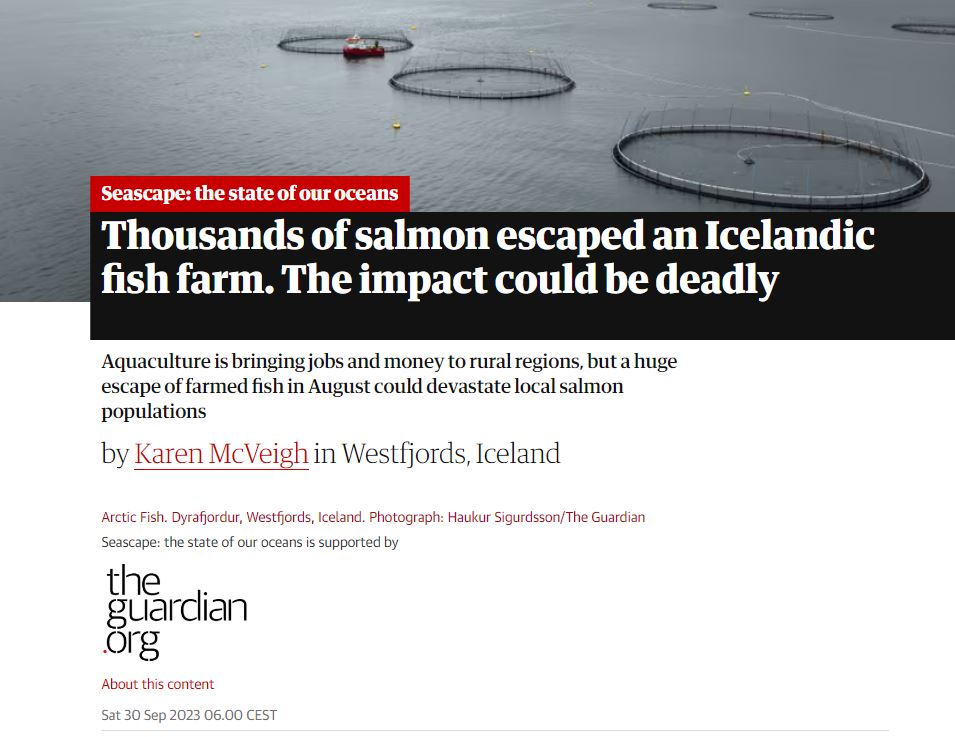 The Guardian birtir í dag þessa vönduðu fréttaskýringu um ástandið hér. Blaðakona frá þessum heimsþekkta fjölmiðli kom til landsins og ræddi við fjölmarga viðmælendur, þar á meðal frá okkur hjá Íslenska náttúruverndarsjóðnum.
The Guardian birtir í dag þessa vönduðu fréttaskýringu um ástandið hér. Blaðakona frá þessum heimsþekkta fjölmiðli kom til landsins og ræddi við fjölmarga viðmælendur, þar á meðal frá okkur hjá Íslenska náttúruverndarsjóðnum.
Við Íslendingar höfum enn tækifæri til að stoppa sjókvíaeldisiðnaðinn. Náttúran mun jafna sig ef hún fær frið til þess en tíminn er að renna út.
The Guardian hefur birt vandaða fréttaskýringu um þær manngerðu hörmungar sem ganga yfir villta laxastofninn okkar.
Blaðakona frá þessum heimsþekkta fjölmiðli kom til landsins og ræddi við fjölmarga viðmælendur, þar á meðal frá okkur hjá Íslenska náttúruverndarsjóðnum.
Við Íslendingar höfum enn tækifæri til að stoppa sjókvíaeldisiðnaðinn. Náttúran mun jafna sig ef hún fær frið til þess en tíminn er að renna út.
Í umfjöllun The Guardian segir m.a.:
…Suspected escapees have now been found in at least 32 rivers across north-west Iceland, according to unconfirmed social media posts, one of which showed fish covered in sea lice, a parasite that can be lethal to wild fish. Iceland’s Marine and Freshwater Research Institute (MRI) confirmed the farmed fish have been found in multiple rivers.
The escape – at a pen in Patreksfjörður owned by Arctic Fish, one of the country’s largest salmon-farming companies, which is owned by Norwegian salmon giant Mowi – has reignited calls from environmentalists, sport fishers and some politicians to restrict or ban open-pen fish farming. It is not the first big escape: just last year, another salmon farming company, Arnarlax, was fined £705,000 for not reporting an escape of 81,000 fish in 2021.
Guðmundur Haukur Jakobsson, Gummi and his father, Jakob, 73, have captured 44 farmed salmon over the past fortnight, after closing the ladder to stop them swimming upstream. At a garage next to his house in nearby Blönduós, a coastal village a short drive from the river, they point out what sets the farmed fish apart for their wild cousins: worn gill covers, shortened and disfigured snouts, and missing or torn fins. Gummi has sent 11 of the fish to MRI for analysis.
“This is an environmental catastrophe,” he says. “If they breed, the salmon will lose their ability to survive.”
Indeed, studies have shown interbreeding between farmed and wild fish produces offspring that mature faster and younger, undermining the ability of the species to reproduce in nature.
There are three reasons, scientists say, this escape is so disastrous: the fish are entering many rivers over a large area; there are in greater numbers than ever seen before; and a high percentage are mature, ready to breed.
Last week, Iceland police opened an investigation into whether Arctic Fish has breached laws governing fish farming. Specialist divers, paid for by Arctic Fish, are hunting down escapees; the firm’s CEO, Stein Ove Tveiten, who along with board members could face up to two years in jail if found guilty of negligence, has apologised for the incident. …
“This is more than a wake-up call,” says Jón Kaldal of Icelandic Wildlife Fund about the escapes. “All red lights should be blinking. You’re talking about the future of wild salmon.”
…
In Iceland, the extent of hybridisation between farmed and wild salmon may be more extensive than previously believed, researchers said in July. Crucially, they also found evidence that the hybrids survived – and produced offspring. Nevertheless, the MRI has raised its catch limit on farmed salmon in Icelandic waters to 105,500 tonnes, or 68 million fish – a threefold increase.
“We know what will happen if we reach that figure,” says Kaldal. “Wild salmon won’t stand a chance.”
He sees the escape incident as a “turning point” that could positively influence the public consultation that’s under way before a new aquaculture bill is expected next year. One of the biggest problems, he says, is the lack of independent surveillance.
“The NAO report confirmed what conservationists have been saying for years,” says Kaldal. “The industry has been given a free ride. They do what they want.”
In Iceland, where nature is prized, most people are against open-pen salmon farming. But in the remote Eastfjords and Westfjords, where the industry is based, it has helped breathe life into sparsely populated rural villages, though it only provides about 5.5% of jobs in the region.
In the tiny port of Þingeyri, Westfjords, where the mountainous landscape dwarfs wooden-clad low houses clustered around Dýrafjörður, most people know someone who works for Arctic Fish. Residents tend to dismiss conservationists as Reykjavík people who don’t understand rural life. House prices have risen – a welcome development – and the fish farms attract incomers.
At a petrol station that becomes the port’s only restaurant when summer fades, Elísa Björk Jónsdóttir says: “It keeps my business afloat through the winter. If it wasn’t for the salmon company, the store wouldn’t be here.” She had heard of the escape.
“I haven’t made up my mind about the risk of extinction of wild salmon. I don’t know if it’s true,” she says.
At the pool, the heart of the port’s 300-strong community, Valdimar Haukur Gislason, 89, a former teacher and now an eider duck farmer, emerges after his morning swim. The population has been falling for years, he says. “The salmon farms are just fine. There’s more employment. Everyone is pro the farms here. It gives people something to do.”
On a red and white service boat from the port to one of Arctic Fish’s four sites here, Bernharður Guðmundsson, site manager at Dýrafjörður, insists the company follows all regulations and says his employees had been insulted by conservationists. “Its like we are terrorists or a tobacco company. They want to stop the industry and we lose jobs, but for what purpose?”
A single pen, measuring 35 metres in diameter, holds between 100,000 and 120,000 fish, more than double Iceland’s wild salmon population. Each site has about 10 pens. Arctic Fish has licences for 21,800 tonnes of salmon in the Westfjords, with two more sites planned.
Asked about official reports that for three months before the escape, three fjords south of Dýrafjörður, underwater inspection of some nets had not been done, Daníel Jakobsson, head of development at Arctic Fish, doesn’t comment on specifics because of the police investigation, but says they are working with the authorities to minimise damage.
“We have been farming for 10 years and this is the first time an incident of this scale has happened,” he says from his office at Ísafjörður, a town in Westfjords.
Jakobsson does not believe the incident has implications for wild salmon. “We have systems in place that ensure wild salmon are not put at risk,” he says. “On top of that, our licences have an expiry date. If we do not behave, we don’t get licences renewed.”…
